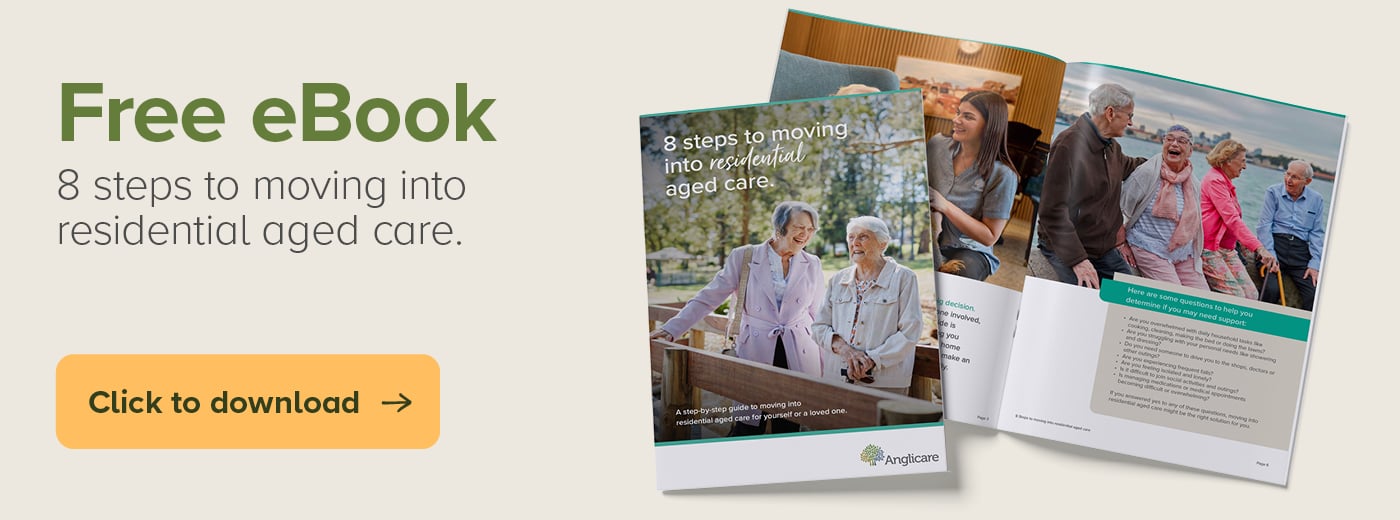Discover how Anglicare builds community and connection in residential aged care homes
Learn how Anglicare’s ResiAction® program supports residents to stay involved in ways that can help build connection, purpose and a sense of community.
ResiAction®, which comes from ‘residents in action’ is an opportunity for residents to play a meaningful and engaging part in their community. Residents may use skills they already have or learn something new. It may be a regular role or something occasional.
In this article, we share insights into why community and connection are important, and what ResiAction® looks like in some of Anglicare’s aged care homes and what it means to the residents.
Visit Farrer Brown Court, and most mornings, you will find Don outside with the hose in hand, watering the garden. For Don, it’s a time to reflect and care for something, to feel part of the place he now calls home. He is nearly 80 and proud of the role he plays in his home’s daily life.
This is the heart of ResiAction® a program that recognises that everyone still has something to offer, no matter their age or ability. At Anglicare, contributing can be arranging fresh flowers for the dining tables, setting up for bingo, delivering the in-house newsletter, or simply showing a new resident around on their first day. Across Anglicare, you’ll find moments like this in each of their aged care homes, every day.
Over at Roden Cutler Lodge, Denise helps coordinate flower arranging with other residents, carefully sorting fresh flowers and guiding new friends in creating vases that brighten up shared spaces.
At Goodhew Gardens you’ll find Wayne chatting to everyone as he makes the rounds, delivering the morning newspaper.
Why is this so important? Because in a world where social isolation is on the rise, nearly 1 in 5 older Australians say they feel lonely some or most of the time. Programs like ResiAction® facilitate connection and community in ways that feel meaningful to residents.
A strong sense of belonging can make all the difference
As people get older, staying connected can get harder. The weekly catch-ups, casual chats, and routines that gave life structure may start to wane.
In fact, a 2025 survey from National Seniors Australia found that a quarter of older people face barriers to staying involved in their communities. For some, it’s physical. For others, it’s emotional. There’s also the lasting impact of the pandemic. While many have rebuilt their social circles, nearly 1 in 10 say they haven’t been able to regain the connections they once had.
This matters because loneliness affects both mental and physical health. The research backs it up: older people who remain connected with others and have strong relationships tend to have a better quality of life, have a lower risk of dementia and mental decline and feel better day to day.
At Anglicare, creating a sense of community and connection is part of everyday life. Through ResiAction®, residents are supported to take on roles that feel meaningful to them, based on what they’re interested in, what they enjoy, or what they’ve always wanted to try.
The aim isn’t to keep busy but to feel part of a community. It’s about recognising that everyone still has something to give and something valuable to share.
It helps build community because residents can be part of how things run. It can spark joy in the little daily interactions, and it can foster love and connection, not just between staff and residents, but between residents themselves.
Curious what community and belonging look like in real life?
Explore Anglicare's residential aged care homes to hear real stories from residents and staff. To stay up to date with what residents are up to, follow them on Instagram and Facebook.
Enquiries
Our team of caring consultants are looking forward to assisting you navigate residential aged care. We understand it can be overwhelming, and it is a time of change and transition for everyone involved. If your need is urgent you may prefer to call 1300 111 278.
If you are interested in Support at Home - please click here.
If you are interested in Aged Care Jobs - please click here.
For residential aged care enquiries please use the form below.
Enquire here


Inspired by the gospel of reconciliation in Jesus Christ, Anglicare's vision for reconciliation is a nation in which Australia's First Peoples are restored in dignity, respect, empowerment and opportunity.



